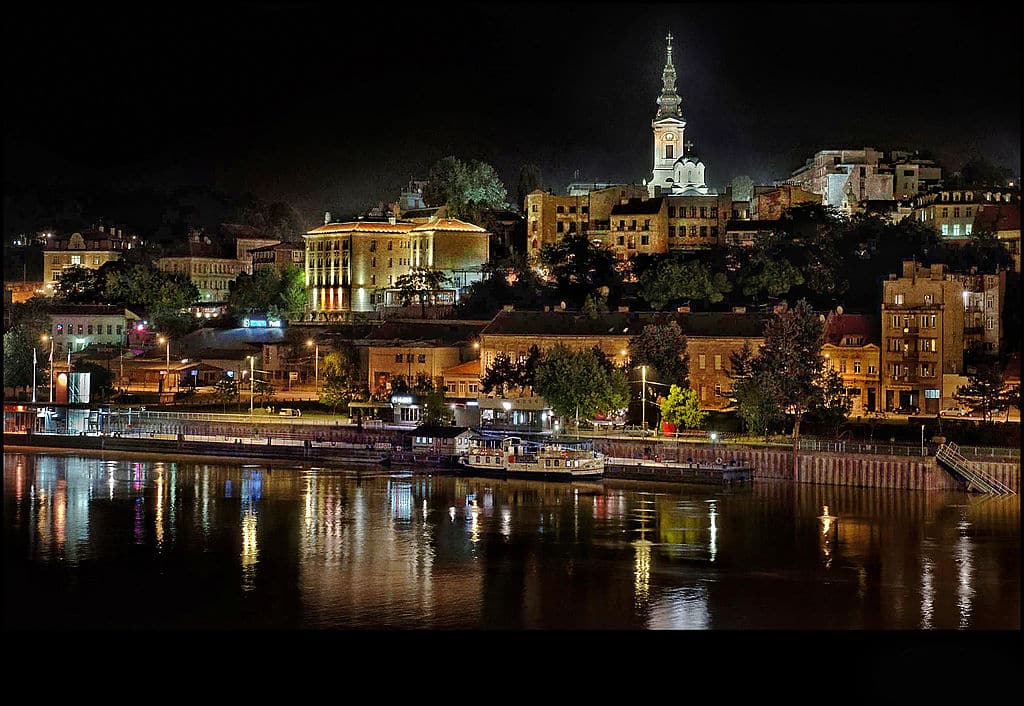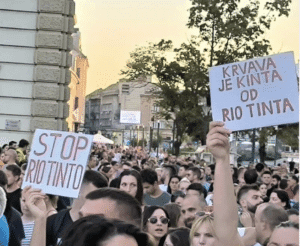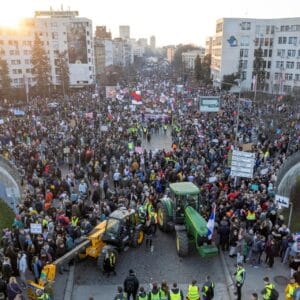Belgrade at night (WikiMedia Commons)
Two-and-a-half weeks after the Serbian election of April 3, coalition formation in the Western Balkan nation seems more difficult than forecasted. Aleksandar Vučić and his SNS party took a large victory at the polls. It seemed probable that he would continue his coalition with the Socialist Party of Serbia (SPS). However, the war in Ukraine has cast a shadow over the cooperation, and progressive, pro-democratic forces in Serbia look for more influence. Meanwhile, the Belgrade elections did not give Vučić a decisive victory. New local elections in Belgrade will likely be organized in the end of 2022.
The end of Vučić’ “middle-ground” foreign policy?
Foreign policy seems to become a key issue in upcoming coalition formation. Until the war in Ukraine, Vučić and his SNS party kept a middle-ground between Russia, China and the European Union. In the lead-up to the elections, Vučić has tried to appease all sides, as Serbia has a distinct stance towards western institutions after NATO interventions in the country in the 1990s. Moreover, Serbia has had a good relation with the Kremlin. On the other hand, it is a European Union candidate since 2012. As the Kremlin is increasingly isolated worldwide after the atrocities in Ukraine, Serbia cannot remain silent on the subject.
Controversially, extremist right-wing parties have won during the last elections. These actors are anti-NATO, anti-EU, nationalistic and have ties to the Kremlin. In the lead-up to the elections, various protests were organized in support of Russia across the country – showing many Serbians still support Moscow. Through Vučić’ middle-ground foreign policy, many of these voters opted for extremist, right-wing parties. It is improbable that these parties will join a future coalition, and Vučić will possibly use their increasing presence to justify appeasing the Kremlin.
More important will be the relation of the SNS with its former coalition partner SPS. The SPS won slightly during last elections and also holds strong ties to the Kremlin. It openly opposes sanctions and an alignment with European institutions. It could demand more input in a future coalition, and officials from both parties were already criticizing each other on national media.
For the democratic, progressive opposition in Serbia, this provides new opportunities. A Vučić rapprochement to progressive politics could include some of the parties that are united in an opposition movement. In the first weeks after the elections, Serbia media showed more sympathy to some of the long-opposed democratic opposition in the country. Already Vučić met his arch rival, the president of the Party of Freedom and Justice (SSP), Dragan Đilas, over possible new elections in the city of Belgrade.
New polls in Belgrade
In Belgrade, new polls are in the cards as both the SNS and the democratic opposition got 55 seats. However, the results are still not official, as various polling booths are re-counted and even re-organized. Independent monitoring missions have found many irregularities during Serbia’s April 3 elections.
On April 11, Aleksandar Vučić (SNS) met with Dragan Đilas (SSP). Other oppositional members of the “United for the Victory of Serbia” coalition reacted surprised on the meeting, saying they were not consulted. Đilas said: “If someone has a better solution, let them say it. But they should not compete with SNS in the sport of attacking Dragan Đilas. The opposition and SNS-SPS now have 55 seats each. The ‘United for Serbia’ and ‘Moramo’ coalition have more votes than SNS. Even if they (SNS-SPS) form a majority, it will not be stable and will lack legitimacy.”
Vučić seems to agree with Đilas – he proposes new elections as he does not wish to share power in the important city council of Belgrade. He gives the initiative to the opposition, saying: “I think that November is not realistic, I am afraid that it will not suit them then, they should have a think, but in essence my answer is ‘yes’.”
Serbia at a crossroads
It is an important time in Serbia, especially for the EU as it seeks more democratic and progressive politics in the country. As the Russian invasion of Ukraine has troubled Belgrade’s stance towards authoritarian politics, it is important that the EU pushes for the inclusion of pro-democratic forces in the political process. Only by honoring democratic norms and values can Serbia come closer to EU-integration – closer to the path of turning its EU candidate-membership into actual accession.
Sources: Foreign Policy Balkan Insight I Balkan Insight II Radio Free Europe Balkan Insight III Transform-network.net
Photo: WikiMedia Commons



